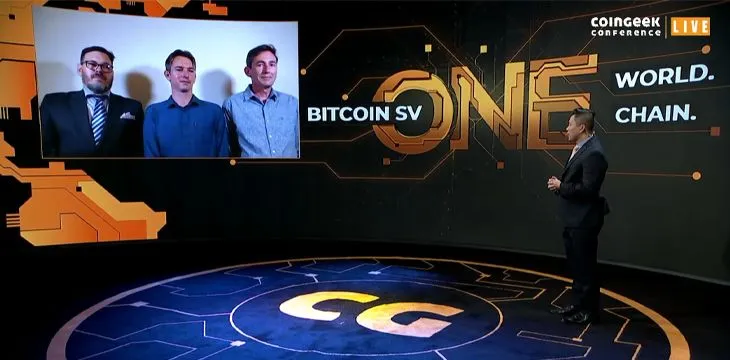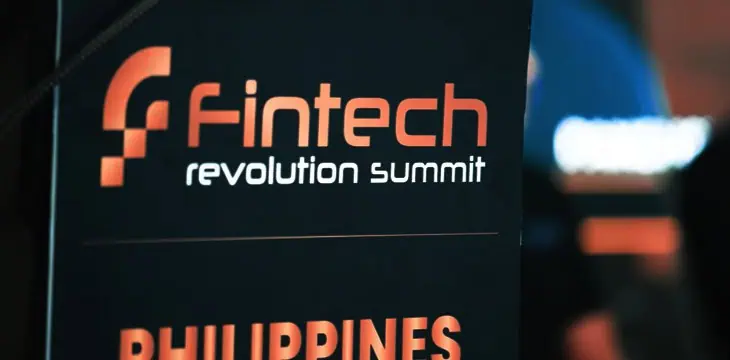|
Getting your Trinity Audio player ready...
|
“With data, it’s crap in, crap out,” said Daniel Keane of Predict Ecology, explaining some of the problems he’s found using existing datasets in environmental projects. Some sets are too small, short-term, or not comprehensive enough to work on useful outcomes. Keane spoke together with Paul Chiari (WeatherSV and MetaStreme) and Brendan Lee (Elas) at CoinGeek Live about using the Bitcoin SV (BSV) ledger to store massive amounts of data generated by everything Internet of Things (IoT) from pumps to trees and even cows.
The three spoke via video hookup from Cairns, Australia—a wet tropical city where having the best data on environmental conditions can make a huge difference to the local ecosystem, agriculture, and lifestyle. They explained how each project is unique, yet brought together on the BSV chain with MetaStreme to create longer-term, more useful datasets for future generations to access.
MetaStreme: the link between Big Data and the BSV chain
Chiari spoke first, giving an update on WeatherSV and the newer MetaStreme project—a system that can provides a connection between any kind of Big Data/IoT system and the BSV blockchain. This involves a database/API link for existing databases, data-generating IoT devices or applications, facilitating access to other data sources, and also arranging payment methods where they’re needed.
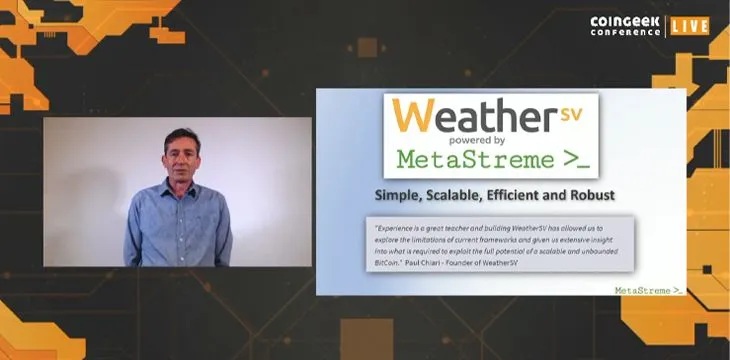
WeatherSV and MetaStreme have produced and process massive amounts of data on the BSV chain, and has so far been one of its heaviest users. They’ve also been a demonstration of how Big Data projects can negotiate stable fee deals with transaction processors and look for more efficient ways to handle them. MetaStreme devised a process to batch multiple outputs into a single input, something Chiari said reduced daily transactions by 70%.
MetaStreme has worked mainly with environmental and agricultural projects so far, given Chiari’s location and background. However it’s capable of processing data streams on the BSV blockchain for any kind of data-generating project. One demonstration Chiari mentioned was tracking Kanye West’s presidential campaign. At its peak, Kanye2020 was hitting 2,847 transactions per second.
MetaStreme has also recently worked with Eli Afram on a project call “b-vote,” building a blockchain-based transparent voting system.
“BSV is the only protocol that’s up to the task,” he said, however, “unbounded scale means we always stay head of demand.”
Conifers and Cassowaries in Cairns: Predict Ecology
Ecologist Daniel Keane talked about Predict Ecology, a company he founded to measure and track something he called “natural capital”—a term to describe the value of an ecosystem that includes the people, plants and wildlife living in and around it.
“Data streams can demonstrate improved environmental services and function,” he said.
Each impacts the other and it’s necessary to gather as much information about all this as possible. Keane gave the examples of Southern Conifers, a local tree that can live for over a thousand years, and Cassowaries, a large and flightless native bird. His system looks at the trees’ growth rate and the birds’ habitat, measuring impact of external factors like carbon dioxide. Where there is a negative impact, with reliable data there’s more hope of the ecosystem being restored.
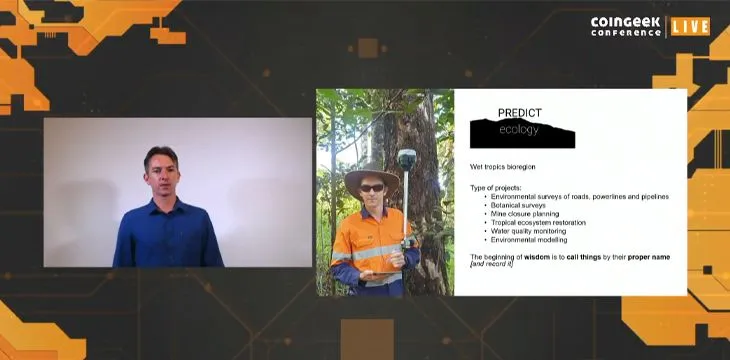
By using BSV Predict Ecology can tokenize individual trees and track their condition. A project he’s working on with the Cairns City Council has already audited 30% of all trees in the city (being tropical, Cairns has a lot more trees than most urban centers).
The data Predict Ecology gathers can be validated, referenced, and audited all in the one place. “It’s a combined dataset of natural capital on the BSV ledger,” he said.
As an ecologist, Keane said he really missed having datasets that covered longer periods of time. However, by processing and storing it all on the Bitcoin BSV blockchain, “my grandchildren will be able to use this.”
Gathering data from IoT devices, and sending it back
Another company with ties to MetaStreme and Predict Ecology—but with the ability to handle anything else—is Elas Digital. Founder Brendan Lee made several announcements about the company, which recently acquired Darren Kellenschwiler’s Probatus (Baemail, ProDesk) and is working on a prototype gold-backed currency token with Amleh Gold.
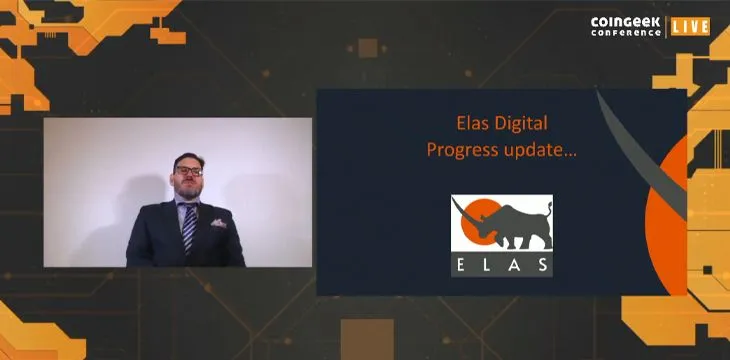
Lee described how Elas handles data from “Internet of Things” (IoT) devices. The first, called Node RED, is a control system management tool that loads software onto the devices and creates a link between then and the BSV chain using tokens and “Bitcoin state machines.”
The demonstration model handled a pump/tank control system. It controls the state of tokens created using input data from each piece of equipment. Using the state machine described above, it then pushes instructions back to the physical equipment to control their function.
Lee also talked about “Moovement,” a food provenance system that tracks a cow’s entire lifespan (and a period of time after it). A GPS-enabled tag attached to the cow’s ear tracks its movement, food, health condition and medical treatments at the farm. After the cow is “processed” and turned into beef, that data is used to generate a report than can then be attached to the product a customer buys in the supermarket. Scanning a QR code gives a full history of the cow’s life—thus guaranteeing more confidence in the food people eat.
Elas is also working on a carbon credit trading system using BSV tokens. “Carbon is a valuable commodity today,”,he said, describing how those with lower outputs can trade their credits on an exchange by selling them to higher CO2 emitters. This is connected to Predict Ecology’s urban trees project, using them as a “carbon abatement resource.” Elas is currently looking at a project in cooperation with the Cairns City Council, and Lee estimated at least $400,000 worth of carbon credits could be traded on the system every year.
Most of the data-generating systems described here cover environmental and political concerns, but the same processes and BSV links could apply to anything that relies on large amounts of data to produce “less crap” outcomes in the future.
IoT devices large and small continue to proliferate. There are 9 billion of them in the world now, and Chiari said estimates predict 13.8 billion by 2024. Something needs to handle all this information, all in one place to avoid silos, and make it auditable. BSV allows all this and can create new economies with data marketplaces—all traceable and auditable, forever.
Watch Brendan Lee’s presentation at CoinGeek Live 2020 Day 2.

 07-15-2025
07-15-2025 
